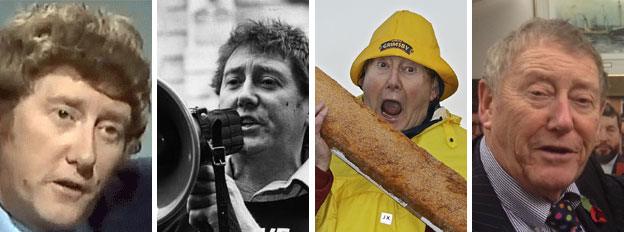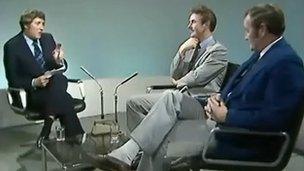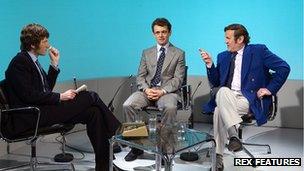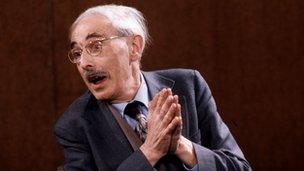Political lives: Austin Mitchell
- Published

Many TV personalities have reinvented themselves as MPs but few have a more colourful tale to tell than veteran Labour backbencher Austin Mitchell.
As New Zealanders gathered around their black and white sets to experience the miracle of television for the first time the face many of them will have seen staring back at them was that of Austin Mitchell.
The Great Grimsby MP, then a young politics lecturer, was an inescapable presence on New Zealand television in the early 1960s.
When he wasn't gently sending-up the customs of his adopted home, the ebullient Yorkshireman was grilling visiting British politicians or offering earnest assessments of the state of the nation.
"I was the Robin Day and Clive James of New Zealand because I was doing comic programmes - which amused me anyway, I don't know what they did for New Zealanders - and serious current affairs."
Television had come late to the country - the first regular broadcasts began in 1960 - and there was only one channel.
'Exciting period'
"They had to watch me," laughs Mitchell, who needs little encouragement to embark on a trip down memory lane when we meet at his offices in Portcullis House, the smart new Commons annexe across the road from Houses of Parliament.
Water consumption in Christchurch shot up when his programme came on as viewers rushed to put on their kettles after Coronation Street had finished, he jokes.
He got his first break in broadcasting doing radio talks, after coming to New Zealand from his native Yorkshire in the late 1950s, to lecture at the University of Otago.
He later distilled his time in the country into a best-selling book, The Half Gallon Quarter Acre Pavlova Paradise, which became a popular phrase in the New Zealand English lexicon.
But it was television that really got its hooks into the young Mitchell: "I think it's the greatest excitement you can have, short of sex. To be live and to be doing an interview which you know thousands are going to watch and living on your wits."
The life of an Oxford don, his chosen career when he returned to the UK in the late sixties, was a poor substitute.
But he did not have to wait long to get back on screen.
A chance meeting with the boss of newly-created Yorkshire Television, in 1969, led to a regular presenting job on nightly news magazine show Calendar.
Regional TV was brimming with cash and self-confidence in the early 1970s. It was an "exciting period", recalls Mitchell, like being on a "pirate ship with lots of money".
Clough v Revie
The corridors of YTV's Leeds studios, in a former carpet factory, were filled with bright young Northerners, and sundry eccentrics, ready to make a name for themselves on the national stage, recalls Mitchell.
Geordie darts commentator Sid Waddell ("a genius with words"), future Countdown presenter Richard Whiteley and "mad scientist" Magnus Pyke were among those to get their first break at the station. All are sadly no longer with us.
Mitchell never made it to network television but he still left his mark on posterity, in a way he would not have predicted at the time.

Mitchell's 1975 YTV Calendar interview with Clough and Revie has gone down in football folklore...
His 1975 interview with Brian Clough and Don Revie - on the night Clough was fired as Leeds United manager after just seven weeks - has achieved legendary status in British football.
Mitchell - not a football fan - seems slightly baffled as to why the encounter, recreated on film in 2009's the Damned United, with actor Mark Bazely playing Mitchell, has endured.
In typical YTV fashion, the live half hour Calendar Special was thrown together at the last minute.
"It was clear to the sports correspondent, as far as anything is ever clear to sports correspondents, that Clough was going to be fired so they were all hanging round at Leeds United's ground and managed to get Clough to agree to come on, whereat they also got Revie to come on.
"I'm not sure who got Revie but both were coming on and each knew that the other was going to be on.
"The only delay was haggling about money - how much were they going to be paid to do the bloody programme rather than who they would appear with.

...and was recreated on film in 2009's The Damned United
"And I did it entirely by accident because I was the only presenter around who was sober and hadn't gone home to a mansion in Ilkley or wherever. I was just available."
The confrontation between the gobby, charismatic Clough and the dour, unbending Revie made for riveting television, but Mitchell is more proud of an interview he did with Harold Wilson, which was picked up by the network when the Labour PM unexpectedly quit.
Like most broadcasters working in Yorkshire in the 1970s, Mitchell also knew Jimmy Savile, who used to live in a camper van parked outside Leeds Infirmary.
"If you wanted to get a comment on a bit of fun or anything you just went up and interviewed Jimmy," he recalls.
Lonely life
Did he have any suspicions that Savile might have been a predatory paedophile?
"No! Nobody did. He was crazy. Crazy like a fox. I didn't know crazy like a pervert as well. I don't think anybody did."
Given how much Mitchell loves television, it seems odd that he would give it all up for, what he soon discovered, is the more boring, and lonely, life of an MP.
He insists, as many long-serving backbenchers do, that he never had ambitions to occupy high office.
It was more a case of seizing the opportunity, as a lifelong Labour supporter, to seek selection as a candidate in a by-election caused by the death of former foreign secretary Tony Crosland.
One of the first people he ran into, as a new boy in the Commons in 1977, was a Labour MP who would shortly be heading in the opposite direction, into TV.
"There was no provision for providing me with an office so I just sat a desk which turned out to belong to Kilroy-Silk, who threw all my papers on the floor and took it back again," recalls Mitchell.
The Commons Mitchell entered, in the dying days of the Callaghan government, was a brutal place of all-night sittings and swaggering party whips, who thought nothing of physically threatening their hapless MP charges.
But Mitchell remembers it fondly. He loved seeing how politics worked from the inside. And he did not give up television entirely, although his decision to co-host a discussion show on the fledgling Sky TV, with Tory grandee Lord Tebbit, helped put an end to his frontbench career.
That and his belief, which was Labour Party policy in the early 1980s, that Britain would be better off out of the European Union.
"By the nineties it was a badge of leprosy. Kinnock was passionately pro-European and anybody who wasn't, wasn't going to get promoted so I gradually drifted into an outlying position on that.
"But the real nemesis was the decision was to take a job with Murdoch, a figure of hate, on Sky.
"And for that Kinnock fired me from the front bench."
Twitter storm
He settled instead into the role of maverick backbencher, working with New Zealander Bryan Gould on an alternative, Eurosceptic form of economics to the one being peddled by the Labour leadership at the time.

Dr Magnus Pyke was among the stars to be given their first break on Yorkshire Television
At 78, he does not know whether he will stand for election again.
He saw his majority slashed by the Conservatives in 2010, hanging on to his seat by just 714 votes, in what was once a safe Labour constituency.
This was due in part to his role in the expenses scandal - he was forced to repay £10,549 after breaking the rules on mortgage repayments due, he says, to being "careless".
More recently, he has been caught up in another 21st Century phenomena - a Twitter storm, after he directed a message at Louise Mensch, the former Tory MP for Corby who said she had quit mid-term to spend more time with her family.
"Shut up Menschkin. A good wife doesn't disagree with her master in public and a good little girl doesn't lie about why she quit politics," said the honourable member for Great Grimsby.
Jaws hit the floor on social media. He was accused of breathtaking sexism.
"What can I say? I thought I was making a joke," he says.

Austin Mitchell is one of Labour's longest-serving MPs
He was accused, most of all, of being a dinosaur. Does he feel like one?
"They were defending feminism with ageism. That's what they were doing.
"I wasn't bothered it's just that (wife) Linda was upset and felt she would never be able to face her feminist friends again and my daughters were upset."
He adds: "It was a five minute wonder. Tories were coming up and saying 'well done'.
"Labour women were averting their gaze as if a significant smell was marching past."
The interview over, Mitchell gets up to pose for photographs next to a cardboard Big Ben-style Countdown clock that was a gift from Richard Whiteley.
Television has changed beyond recognition since Mitchell first made a name for himself in New Zealand. He bemoans the fact that political discussion has now been ghettoised in the schedules.
It rarely commands a prime time slot as it did in his YTV heyday. Viewers have far more choice.
But the adrenaline rush of live TV is still something he seems to crave and he rarely misses an opportunity to get a fix.
"Television is a bug. It bites you and you can't shake it off. You want to do it."
- Published18 June 2012